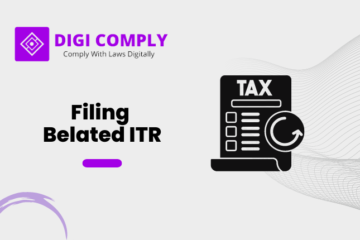As tax season starts, people earning income must remember to file their Income Tax Returns (ITR) for the year 2023-24 by 31st July 2023. Filing the ITR is not only a legal obligation but also a significant responsibility that all citizens must embrace to contribute to the nation’s economic growth and development. Understanding the importance of adhering to this deadline is critical, as it ensures your tax affairs are in proper order, helping you avoid potential penalties and unnecessary hassles that may arise from delayed filings.
Unraveling the Essence of Income Tax Return (ITR):
The Income Tax Return (ITR) is more than just a formality; it is a fundamental document that individuals and entities utilize to report their income earned during a financial year and the corresponding taxes paid on it to the government. This process serves as a vital mechanism for the government to assess an individual’s or entity’s tax liability and to ensure that taxpayers fulfill their financial obligations honestly and transparently. By complying with the ITR filing requirements, individuals actively contribute to the country’s economic infrastructure, enabling the government to allocate resources effectively for various developmental projects and social welfare initiatives.
Importance of Timely ITR Filing:
Promptly filing your ITR boasts a multitude of benefits and should not be underestimated or delayed. Let’s delve into the significant reasons why filing before the due date is not just prudent but imperative:
- Avoidance of Penalties: One of the primary motivations for filing your ITR before the deadline is to evade penalties. Failing to comply with the 31st July 2023 deadline can lead to the imposition of penalties, which can escalate into substantial amounts. This financial burden, in addition to your existing tax liability, can create unnecessary stress and adversely impact your fiscal planning.
- Timely Claiming of Tax Refunds: By adhering to the filing deadline, eligible taxpayers can expect to receive their tax refunds promptly. Many individuals find themselves eligible for refunds due to excess tax deductions at source (TDS) or supplementary tax payments made throughout the financial year. Filing on time expedites the refund process, offering much-needed financial relief to taxpayers who may be awaiting these funds for various personal or business purposes.
- Facilitating Credit Card Processing and Loan Approvals: The financial world revolves around creditworthiness, and filing your ITR punctually plays a crucial role in strengthening it. Banks and financial institutions often request a copy of your ITR as proof of your income when you apply for credit cards, loans, or other financial products. Consistent and timely ITR filings portray you as a reliable and responsible borrower, thus improving your chances of securing favorable loan terms and interest rates.
- Leveraging Loss Carry Forward: The benefits of timely ITR filing extend beyond the present financial year. When losses are incurred during a financial year, filing your ITR on time allows you to carry forward those losses to subsequent years. This strategic move enables you to offset these losses against future profits, effectively reducing your tax liability in the coming years and optimizing your tax planning.
Incorporating Best Practices for Timely ITR Filing:
To ensure smooth and timely ITR filing, adopting certain best practices can prove invaluable. Here are some essential tips to streamline the process:
- Organize Your Documents: Well in advance of the deadline, gather all necessary documents, such as Form 16, bank statements, investment proofs, and other income-related records. Proper organization saves time and minimizes the risk of overlooking crucial financial details.
- Embrace Online Platforms: In the digital age, online tax filing platforms have simplified the ITR filing process. Consider utilizing reputable online platforms or seek guidance from experienced tax professionals to ensure accuracy and efficiency in your filings.
- Verify Your Details: Accuracy is paramount when filing your ITR. Double-check all the information provided in your return to avoid any discrepancies or errors that might lead to delays in your tax assessment.
- Presumptive Taxation Scheme: If eligible, consider utilizing the Presumptive Taxation Scheme, which can simplify your tax calculations. Consulting a tax expert can help determine whether this scheme aligns with your financial situation and benefits you in the long run.
Conclusion:
In conclusion, filing your Income Tax Return (ITR) before the due date of 31st July 2023 is not merely a statutory requirement but also a pivotal aspect of responsible citizenship and financial compliance. The process enables the government to accurately assess your tax liability, facilitates timely refund claims, and helps you avoid potential penalties. By proactively organizing your documents, leveraging online platforms, and ensuring accurate details, you can make the ITR filing experience hassle-free and precise. Embracing this responsibility not only empowers us as taxpayers but also strengthens the economic fabric of our country for a brighter future.
If You have any queries then connect with us at support@legalsuvidha.com or info@digicomply.in & contact us & stay updated with our latest blogs & articles





